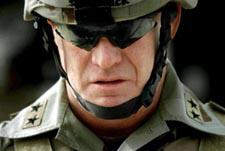Someone just told me about the Kobayashi Maru Test from the Star Trek Series. Since I am not a trekkie, I may as well rip off the Wikipedia article's description of the test:
The Kobayashi Maru is a test in the fictional universe of Star Trek. It is a Starfleet training exercise designed to test the character of cadets in the command track at Starfleet Academy. The Kobayashi Maru test was first depicted in the opening scene of the film Star Trek II: The Wrath of Khan and also appears in the 2009 film Star Trek. The test's name is occasionally used among Star Trek fans or those familiar with the series to describe a no-win scenario.
Rescuing the civilian vessel Kobayashi Maru is the notional primary goal in a simulated battle with the Klingons. The ship is disabled and the approaching cadet crew must decide whether or not to attempt rescue of the Kobayashi Maru crew – potentially endangering their own ship and lives – or leave the Kobayashi Maru to certain destruction. The difficult decision to assist the Kobayashi Maru revolves around the issue of the disabled ship's location being in the Klingon Neutral Zone, as entering the zone would be in violation of the Organian Peace Treaty.
While I am not a trekkie, I am a former military officer, which takes me to the next part of the story about test:
[caption id="" align="alignright" width="125" caption="This man will personally kick the arse of anyone who cheated at a Military Academy."][/caption]

James T. Kirk took the test three times while at Starfleet Academy. Prior to his third attempt, Kirk surreptitiously reprogrammed the simulator so that it was possible to rescue the freighter. This fact finally comes out in Star Trek II: The Wrath of Khan, as Kirk, Saavik and others appear marooned, near death. Saavik's response is, "Then you never faced that situation. Faced death." Kirk replies, "I don't believe in the no-win scenario." Despite having cheated, Kirk had been awarded a commendation for "original thinking."
Now, I know this is the movies, which is why the coming rant may seem odd.
In reality, Kirk would have been tossed out of the Academy on his arse for having cheated. If he did end up on a starship, he would more likely be a messmate with Lister and Rimmer on the Red Dwarf. This comes from Ethics and the Military:
He has integrity if his interest in the good of the Service is at all times greater than his personal pride, and when he holds himself to the same line of duty when unobserved as he would follow if all of his superiors were present.
Brigadier General S.L.A. Marshall, The Armed Forces Officer, 1950
The concepts of honor and integrity are reflected in the statement of core values of the armed services and provide the underpinnings of the military way of life. The occasional perception of misconduct among military personnel challenges the notion that the military holds itself to high ethical standards. In an effort to respond to media criticism and with an eye toward implementing a continuing process of self-examination, military writers, theorists, and professionals discuss ways in which the military can ensure that personnel adhere to high standards of accountability. Those standards are exemplified in behavior in everyday life as well as under the stress of combat. They are reflected in the military mind-set --the ways in which personnel not only relate to one another, but, also, in the manner in which they contribute to the decision making process, exercise leadership roles, and interpret significant and timely world events. Concerns range from an examination of honor codes at the service academies to consideration of more cosmic matters such as nuclear deterrence, the use of biological and chemical warfare, the development of just war doctrine, and the ethics of intervention. The Gulf War and recent peacekeeping initiatives did much to stimulate debate and discussion on a host of issues relating to ethical dilemmas and the ethical climate of the armed forces.
In other words, the military sets high standards for ethics. The US Military Academies have Honour Codes and I am going to take from the USMA's code the example of cheating:
CHEATING: A violation of cheating would occur if a Cadet fraudulently acted out of self-interest or assisted another to do so with the intent to gain or to give an unfair advantage. Cheating includes such acts as plagiarism (presenting someone else's ideas, words, data, or work as one's own without documentation), misrepresentation (failing to document the assistance of another in the preparation, revision, or proofreading of an assignment), and using unauthorized notes.
Three rules of thumb from the USMA's Honour Code are:
1. Does this action attempt to deceive anyone or allow anyone to be deceived?
2. Does this action gain or allow gain of a privilege or advantage to which I or someone else would not otherwise be entitled?
3. Would I be unsatisfied by the outcome if I were on the receiving end of this action?
I think that Kirk's actions fit quite well into rule (2).
So, rather than being a top Star Fleet commander who was awarded a commendation for "original thinking", Kirk would have been disgraced by his actions in the real world. Even if the Academy tolerated his actions, I have serious doubts that the other cadets and officers would have.
But, it's just a movie.
